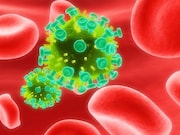Cell-associated HIV DNA ID’d in CSF in nearly half of participants, tied to worse neurocognitive outcomes
TUESDAY, July 16, 2019 (HealthDay News) — About half of HIV-positive individuals on long-term antiretroviral therapy (ART) have HIV-infected cells in their cerebrospinal fluid (CSF), according to a study published online July 15 in the Journal of Clinical Investigation.
Serena Spudich, M.D., from Yale University in New Haven, Connecticut, and colleagues examined HIV persistence in CSF and associations with inflammation and neurocognitive performance during long-term ART. Sixty-nine participants enrolled in the AIDS Clinical Trials Group HIV Reservoirs Cohort Study underwent concurrent lumbar puncture, phlebotomy, and neurocognitive assessment. Cell-associated (CA) HIV DNA and RNA were measured in peripheral blood mononuclear cells and in cell pellets from CSF, while cell-free HIV RNA was quantified in CSF supernatant and blood plasma.
Participants were assessed after a median 8.6 years of ART. The researchers found that cell-free RNA, CA-RNA, and CA-DNA were detected in the CSF of 4, 9, and 48 percent of participants, respectively. A correlation was noted for detection of cell-free CSF HIV RNA with higher plasma HIV RNA. No correlation was seen for CSF inflammatory biomarkers with HIV persistence measures. Even after adjustment for age and CD4 nadir count, the investigators observed a correlation between detection of CSF CA-DNA and worse neurocognitive outcomes, including Global Deficit Score.
“I don’t know of a single infectious disease that is easier to treat when it’s in the brain than when it’s elsewhere in the body,” senior author John Mellors, M.D., of the University of Pittsburgh, said in a statement. “It is difficult to target infections that lurk in the brain and HIV is probably not an exception to the rule. We have our work cut out for us in the quest for an HIV cure, but knowing is half the battle, so I’m cautiously optimistic.”
Several authors disclosed financial ties to the pharmaceutical industry.
Copyright © 2019 HealthDay. All rights reserved.








